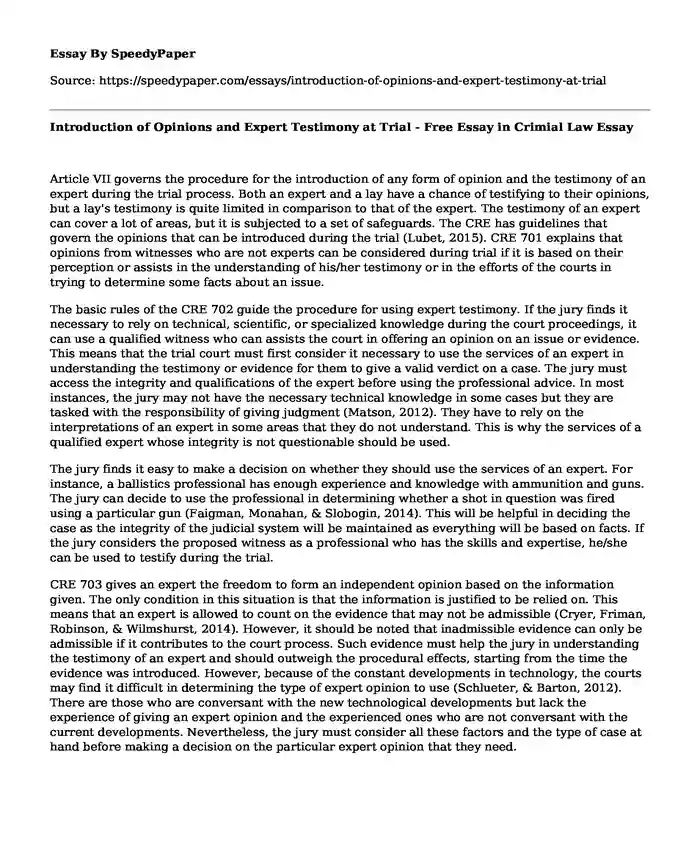
| Type of paper: | Essay |
| Categories: | Criminal law |
| Pages: | 3 |
| Wordcount: | 682 words |
Article VII governs the procedure for the introduction of any form of opinion and the testimony of an expert during the trial process. Both an expert and a lay have a chance of testifying to their opinions, but a lay's testimony is quite limited in comparison to that of the expert. The testimony of an expert can cover a lot of areas, but it is subjected to a set of safeguards. The CRE has guidelines that govern the opinions that can be introduced during the trial (Lubet, 2015). CRE 701 explains that opinions from witnesses who are not experts can be considered during trial if it is based on their perception or assists in the understanding of his/her testimony or in the efforts of the courts in trying to determine some facts about an issue.
The basic rules of the CRE 702 guide the procedure for using expert testimony. If the jury finds it necessary to rely on technical, scientific, or specialized knowledge during the court proceedings, it can use a qualified witness who can assists the court in offering an opinion on an issue or evidence. This means that the trial court must first consider it necessary to use the services of an expert in understanding the testimony or evidence for them to give a valid verdict on a case. The jury must access the integrity and qualifications of the expert before using the professional advice. In most instances, the jury may not have the necessary technical knowledge in some cases but they are tasked with the responsibility of giving judgment (Matson, 2012). They have to rely on the interpretations of an expert in some areas that they do not understand. This is why the services of a qualified expert whose integrity is not questionable should be used.
The jury finds it easy to make a decision on whether they should use the services of an expert. For instance, a ballistics professional has enough experience and knowledge with ammunition and guns. The jury can decide to use the professional in determining whether a shot in question was fired using a particular gun (Faigman, Monahan, & Slobogin, 2014). This will be helpful in deciding the case as the integrity of the judicial system will be maintained as everything will be based on facts. If the jury considers the proposed witness as a professional who has the skills and expertise, he/she can be used to testify during the trial.
CRE 703 gives an expert the freedom to form an independent opinion based on the information given. The only condition in this situation is that the information is justified to be relied on. This means that an expert is allowed to count on the evidence that may not be admissible (Cryer, Friman, Robinson, & Wilmshurst, 2014). However, it should be noted that inadmissible evidence can only be admissible if it contributes to the court process. Such evidence must help the jury in understanding the testimony of an expert and should outweigh the procedural effects, starting from the time the evidence was introduced. However, because of the constant developments in technology, the courts may find it difficult in determining the type of expert opinion to use (Schlueter, & Barton, 2012). There are those who are conversant with the new technological developments but lack the experience of giving an expert opinion and the experienced ones who are not conversant with the current developments. Nevertheless, the jury must consider all these factors and the type of case at hand before making a decision on the particular expert opinion that they need.
References
Cryer, R., Friman, H., Robinson, D., & Wilmshurst, E. (2014). An introduction to international criminal law and procedure. Cambridge University Press.
Faigman, D. L., Monahan, J., & Slobogin, C. (2014). Group to individual (G2i) inference in scientific expert testimony. The University of Chicago Law Review, 417-480.
Lubet, S. (2015). Expert testimony: a guide for expert witnesses and the lawyers who examine them. LexisNexis.
Matson, J. V. (2012). Effective expert witnessing: practices for the 21st century. CRC Press.
Schlueter, D. A., & Barton, R. R. (2012). Texas Rules of Evidence Manual. Juris Publishing, Inc.
Cite this page
Introduction of Opinions and Expert Testimony at Trial - Free Essay in Crimial Law. (2019, Jul 18). Retrieved from https://speedypaper.net/essays/introduction-of-opinions-and-expert-testimony-at-trial
Request Removal
If you are the original author of this essay and no longer wish to have it published on the SpeedyPaper website, please click below to request its removal:
- Bhagwandas Metals Limited - Free Essay on Financial Statements
- Essay Example: Critiques of Influencing Health Care in the Legislative Arena
- Literary Essay Example: Analysis of The Rumor
- Art Essay Example: Glass and Fruit by George Braque
- "I Wandered Lonely As a Cloud" - Poem Analysis Essay Sample
- Free Essay Sample on Australian Foreign Policy
- Paper Example. Questions in Psycholinguistics
Popular categories




